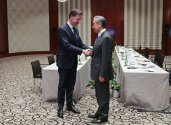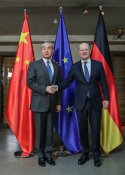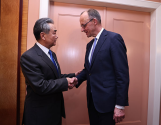The senior American diplomat slipped quietly into Belarus, a police state run by a strongman reviled for decades in the West, traveling by car across the border for meetings with President Aleksandr G. Lukashenko and the head of his KGB security apparatus.
It was Mr. Lukashenko’s first meeting with a senior State Department official in five years, and the start of what could be a highly consequential thawing of frozen relations between the United States and Russia’s closest ally.
The below-the-radar American visit to Minsk, the Belarusian capital, on Wednesday came just a day after President Trump had a long telephone call with President Vladimir V. Putin of Russia. Both events signaled Washington’s departure from a yearslong policy of trying to isolate leaders out of favor in the West because of their repressive policies and the war in Ukraine.
After talks with Mr. Lukashenko, Christopher W. Smith, a deputy assistant secretary of state, and two other American officials drove to a village near the border with Lithuania. There, courtesy of the Belarusian KGB, three people who had been jailed — an American and two Belarusian political prisoners — were waiting to be picked up.
As darkness fell, the Americans and the freed prisoners drove back across the border to Vilnius, the Lithuanian capital. Speaking outside the U.S. Embassy there on Wednesday evening, Mr. Smith hailed the successful completion of what he called “a special operation,” describing the prisoners’ release as a “huge win and a response to President Trump’s peace through strength agenda.”
The next step, Mr. Smith told a gathering of Western diplomats on Thursday in Vilnius, according to people who attended, is a possible grand bargain under which Mr. Lukashenko would release a slew of political prisoners, including prominent ones. In return, the United States would relax sanctions on Belarusian banks and exports of potash, a key ingredient in fertilizer, of which Belarus is a major producer.
Mr. Smith, according to diplomats who attended his briefing, said the primary U.S. goal was to secure freedom for more political prisoners. He said he had asked Mr. Lukashenko whether he was ready to scale back repression and was assured that he was. Another important aim, Mr. Smith told the diplomats, is to give Mr. Lukashenko some breathing room outside Russia’s orbit of influence.
Piotr Krawczyk, a former head of Poland’s foreign intelligence service who worked with the first Trump administration on loosening Russia’s grip on Belarus, said Belarus was “part of a wider American approach toward Russia.”
The United States is “confronting Russia in Ukraine, in Africa, in the oil and gas sector, and in several other strategic areas,” he said. “Negotiating with Belarus creates additional leverage for the U.S. to signal to Russia that they should be more attentive to American arguments.”
Mr. Shraibman, the exiled analyst, said a big question now was how the Kremlin would react to any rapprochement between Belarus and the West. Many Russian officials “would likely panic at the prospect,” he said, but “there is no quick or easy way for Belarus to distance itself from Russia given Moscow’s economic dominance over the country.”
He added that it was unlikely that President Trump “has any particular interest in, understanding of or a plan for Belarus.” Even so, he said, the “Trump factor certainly creates some momentum, as everyone, including Lukashenko, tries to impress the U.S. president and compete for his attention.”
Last edited:




